
[ad_1]
This October 10 marks the World Mental Health Day and UNICEF presented a report titled “The State of the World’s Children 2021, In My Mind: Promoting, Protecting and Supporting Children’s Mental Health”. There he warned that the effects of the coronavirus pandemic on the mental health and well-being of children and adolescents could last for years and demanded that governments become more engaged in addressing this issue.
According to the poll conducted with Gallup in 21 countries, 1 in 5 young people between the ages of 15 and 24 report feeling depressed or with little interest in doing some sort of activity. The survey also found that at least 1 in 7 children were directly affected by the closures, while more than 1.6 billion children suffered a loss in their education.
“The disruption of routines, education and recreation, as well as family concerns about income and health, cause many young people to feel fear, anger and worry about their future, ”the report says.
In Argentina, Unicef conducted a rapid survey in May that found 33% of teens feel devastated by the pandemic, while 25% said be afraid in the face of the uncertainty of the context. In addition, 72 percent “felt the need to ask for some form of support related to their emotional well-being.” “Adolescents were especially affected emotionally, particularly in connection with loss of projects, reduction of their possibilities of participation and the construction of social links“, says the report.
Suicide and protective factors
According to Unicef, 46,000 adolescents commit suicide each year around the world, making it one of the top five causes of death for this age group. In Argentina, meanwhile, a total of 459 adolescents died by suicide in 2019, accounting for 15% of all adolescent deaths, becoming the leading cause of death from external causes.
According to the report, the mental health of children and adolescents consists of a “combination of genetic aspects, personal experiences and environmental factors”, among which stand out the quality of parenthood, exposure to violence or sexual abuse, schooling, opportunities for participation, discrimination, poverty, humanitarian crises and health emergencies, such as covid-19.
In this direction, “Protective factors”, such as the presence of caring caregivers, safe school environments and positive peer relationships, can reduce the risk of mental health problems. However, there are important obstacles, “like the stigma and lack of funding for adequate services, which prevent too many boys and girls from enjoying positive mental health or accessing the support they need, ”the agency warned.
In this context, Unicef called on governments and public and private sector partners for greater engagement on the issue, with more investment in prevention, promotion and mental health care programs, and more integrated intersectoral work, which contains all protective factors, from mothers, fathers, caregivers, to schools and health sectors. “It is necessary break the silence around mental illness, fight stigma, promote a better understanding of mental health and take the experiences of children and youth seriously “, concludes the report.
.
[ad_2]
Source link
 Naaju Breaking News, Live Updates, Latest Headlines, Viral News, Top Stories, Trending Topics, Videos
Naaju Breaking News, Live Updates, Latest Headlines, Viral News, Top Stories, Trending Topics, Videos